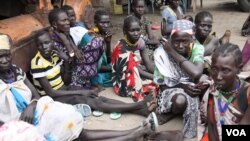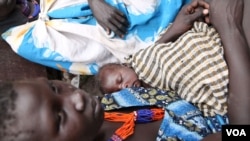PIBOR, SOUTH SUDAN —
Continued violence has forced more than 100,000 people from a minority tribe into the bush in South Sudan's Pibor County. This follows another round of ethnic violence in Jonglei state. Aid agencies are struggling to mount a humanitarian response to feed 60,000 people who have been surviving on leaves - some for more than six months. But aid access is limited and many people are too scared to come to the towns for fear of abuse by security forces.
Near Pibor town, scores of women have spent days, weeks, and sometimes months, hiding in the bush to wait for food. Yayicho Koko, who has walked from the bush for hours with her baby strapped on her back, explained that living conditions are dire, with people reduced to scavenging and crouching in the shadows like hunted animals.
She said there are no medicines to help the people in the bush.
Some of these people hiding in the bush fled when thousands of armed men and boys from the rival clan, Lou Nuer, marched from northern Jonglei to attack the Murle living in Pibor County. No Murle casualties have yet been reported. But Lochdan Kengen, who also fled her village when attackers came, said the dead and wounded are scattered in the bush.
She said she believes people were killed - shot at from behind as they were fleeing.
Human right abuses
Tens of thousands of Murle had fled the county long before this latest attack due to reported serious human rights abuses by state security forces on civilians. They include rape, torture and murder, and were carried out even on children, women and the elderly in Pibor County during a state-wide disarmament campaign following deadly ethnic fighting between the Lou Nuer and Murle in January 2012.
This ethnic fighting and violence by security forces has prompted many young men to flee to join rebel leader David Yau Yau. The former theologian and Murle official broke away from the government in April 2012 and reportedly is supported by Sudan. Efforts to calm the situation have not yielded results so far, and have even faltered.
Pibor County Commissioner Joshua Konyi said there was no response when he alerted authorities to reports of new fighting involving the Lou Nuer, Yau Yau and government troops. Konyi said the violence is escalating, and many Murle are wounded, but too scared to seek help, due to mistrust of authorities and a spiraling cycle of revenge.
Konyi urges the government to be serious about the committee for peace and to hurry so that proper peace talks with the Yau Yau can be held. He said there also needs to be an investigation into alleged abuses, which he said are increasing.
Bloody feuding
The centuries-old cattle raiding tradition between the Murle and Lou Nuer has taken on a new brutality due to a legacy of decades of civil war with Sudan, making weapons available.
Jonglei’s Minister for Youth and Sports, Baba Medan Konyi, said he is trying to reach out to these young men to end the retaliatory violence and compete instead in healthy activities. He said the main obstacle, though, is access.
“We are facing this problem of insecurity in the state. And it won’t give us a chance to move to the counties and talk to the youth so that we can engage them with sport,” he said.
He said he has not lost hope, however, for a new nation born out of so much war.
“As a new nation, yes, we have many challenges. If you go to the U.S. maybe 200 years back, there were many challenges. And I believe one day that South Sudan can change and all this will stop,” said Konyi.
U.S. Secretary of State John Kerry recently called South Sudan’s President Salva Kiir, urging him to address the ethnic violence in Jonglei, stamp out rights abuses by security forces and to punish the perpetrators.
Whether that call is heeded could decide the fate of civilians in Pibor County and beyond.
Near Pibor town, scores of women have spent days, weeks, and sometimes months, hiding in the bush to wait for food. Yayicho Koko, who has walked from the bush for hours with her baby strapped on her back, explained that living conditions are dire, with people reduced to scavenging and crouching in the shadows like hunted animals.
She said there are no medicines to help the people in the bush.
Some of these people hiding in the bush fled when thousands of armed men and boys from the rival clan, Lou Nuer, marched from northern Jonglei to attack the Murle living in Pibor County. No Murle casualties have yet been reported. But Lochdan Kengen, who also fled her village when attackers came, said the dead and wounded are scattered in the bush.
She said she believes people were killed - shot at from behind as they were fleeing.
Human right abuses
Tens of thousands of Murle had fled the county long before this latest attack due to reported serious human rights abuses by state security forces on civilians. They include rape, torture and murder, and were carried out even on children, women and the elderly in Pibor County during a state-wide disarmament campaign following deadly ethnic fighting between the Lou Nuer and Murle in January 2012.
This ethnic fighting and violence by security forces has prompted many young men to flee to join rebel leader David Yau Yau. The former theologian and Murle official broke away from the government in April 2012 and reportedly is supported by Sudan. Efforts to calm the situation have not yielded results so far, and have even faltered.
Pibor County Commissioner Joshua Konyi said there was no response when he alerted authorities to reports of new fighting involving the Lou Nuer, Yau Yau and government troops. Konyi said the violence is escalating, and many Murle are wounded, but too scared to seek help, due to mistrust of authorities and a spiraling cycle of revenge.
Konyi urges the government to be serious about the committee for peace and to hurry so that proper peace talks with the Yau Yau can be held. He said there also needs to be an investigation into alleged abuses, which he said are increasing.
Bloody feuding
The centuries-old cattle raiding tradition between the Murle and Lou Nuer has taken on a new brutality due to a legacy of decades of civil war with Sudan, making weapons available.
Jonglei’s Minister for Youth and Sports, Baba Medan Konyi, said he is trying to reach out to these young men to end the retaliatory violence and compete instead in healthy activities. He said the main obstacle, though, is access.
“We are facing this problem of insecurity in the state. And it won’t give us a chance to move to the counties and talk to the youth so that we can engage them with sport,” he said.
He said he has not lost hope, however, for a new nation born out of so much war.
“As a new nation, yes, we have many challenges. If you go to the U.S. maybe 200 years back, there were many challenges. And I believe one day that South Sudan can change and all this will stop,” said Konyi.
U.S. Secretary of State John Kerry recently called South Sudan’s President Salva Kiir, urging him to address the ethnic violence in Jonglei, stamp out rights abuses by security forces and to punish the perpetrators.
Whether that call is heeded could decide the fate of civilians in Pibor County and beyond.





